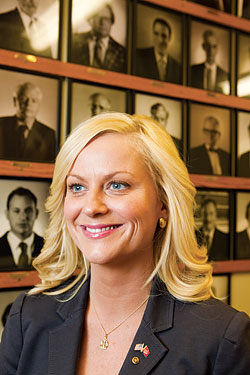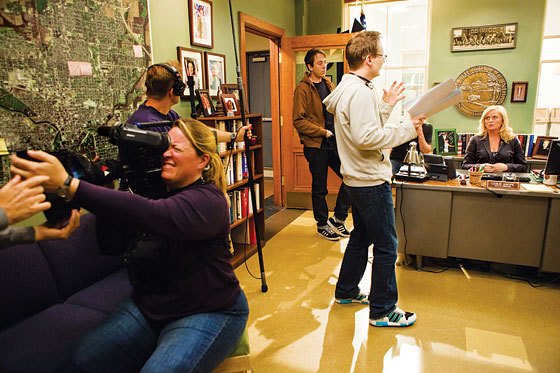
It is fitting, in an age when our banks, automobile manufacturers, and insurance companies are owned primarily by Barack Obama and Uncle Sam, that our newest sitcom locale is not a bar, or a law firm, or the revolving-door apartment of upwardly mobile and fabulous twentysomethings. Our hero (or, in this case, heroine) is not an advertising executive, crass agent, or morally compromised lawyer. Instead, Leslie Knope, as played by Amy Poehler in Parks and Recreation, which premieres this Thursday night on NBC, works for the government. Sure, she’s the deputy director for the Pawnee, Indiana, Parks Department, but hey, not everybody can work in the West Wing.
Knope is an idealistic, hopeful, and endlessly optimistic do-gooder who honestly believes that government can make the world a better place. Of course, because her show is “from the people who bring you The Office” (as you might have heard 80 times if you’ve been watching NBC at any point in the last two months), she’s also deluded, kind of vain, and completely out of her depth. But she means well, and, as the saying goes, that’s close enough for government work. Corporate red tape is one thing; we now have our first show about municipal bureaucracy. The office comedy is getting a bailout.
“When we were talking about this, we were in the middle of the election,” says Parks and Recreation co-creator (and one of those former writer-producers of The Office) Michael Schur. “The economy hadn’t collapsed yet, but we got the general sense that the government was going to be playing a more significant role in years to come. We had no idea how right we were.”
Thus, the clueless bosses are no longer reporting back to the corporate home office: They’re reporting back to Washington. (Or, as the case may be, Pawnee City Hall.) On The Office, employees are shiftless, lazy, and uninspired by their work, so nothing gets done. On Parks and Recreation, it’s the opposite: Idealistic wannabe politicians and concerned citizens strive to make the world a better place, and keep getting rebuffed by democracy. Schur says that when he was doing initial research, he talked to urban planners in Claremont, California, about the show’s central conceit of Knope trying to transform an abandoned construction site into a city park. Was Schur’s idea that the project would end up Godot-ian in its inertia—the joke is that the Pawnee Parks and Recreation Department can’t get it started, let alone completed—realistic? The Claremont employees laughed, because that very week, they were breaking ground on a new park. The time between project conception and initial assembly? Eighteen years. “We thought, Okay, that’ll work,” Schur says. “If our show’s on for eighteen years, we’ll be pretty happy.”
It’s like The Office, only in the public sector! isn’t the sexiest television pitch ever, yet that’s not far from how this show came about. Notoriously overstimulated NBC Entertainment co-chairman Ben Silverman initially approached Office creator Greg Daniels about a spinoff. But once Daniels signed up Schur, the duo quickly dismantled the notion of a satellite Dunder Mifflin. They claim they just “couldn’t find the right fit,” though no one seems particularly upset that this isn’t just The Office: Indiana. And Parks does keep The Office’s mockumentary format—which is how Schur would shoot every show if he could: “I think it’s the best way to tell a story on television.”
So while the connection between the two shows can’t be missed, Parks is not a spinoff at all. It is, however, something of a bellwether for NBC, which has seen better days (it is currently ranked fourth among the major networks). Since the show was announced, Jay Leno has taken five hours of prime time a week, all of Silverman’s new shows have tanked, and Parks and Recreation, because of its ties to one of NBC’s lone hits, has become the last great hope. Hence the now-infamous leaking of the results of one of the show’s test screenings by Nikki Finke’s Deadline Hollywood Daily, which claimed audiences found the show a “carbon copy” of The Office, that it was “slow” and “predictable,” and that its male leads were “sleazy.” Focus groups have been wrong, and their observations certainly won’t be confused with the work of Pauline Kael, but it was probably not a happy day for Silverman.
Schur isn’t concerned. “That information was presented to the world as if we had sat around nervously waiting to see if people liked it, but we had long since moved on; we’d done four or five complete edits on the pilot by the time we got the focus-group results back,” he says. But clearly the ante on the show has been raised—a situation that, sensibly, everyone on set is trying to ignore. “You can’t think about stuff like all that, or you’ll go cuckoo bananas,” says Poehler, who is the most recognizable member of the cast (which includes second-most-recognizable member Rashida Jones, another Office veteran). According to Schur, Poehler is the show’s raison d’être. “Since 1997, when I first moved to New York and first saw Amy Poehler perform, I have thought she was the funniest person I’d ever met,” he says. “My goal and dream of this show was to provide a showcase for her abilities. If it works and she gets to play this character for a long time, I will have done my job.”

Poehler has had a wild twelve months: Right after finishing her Sarah Palin rap on Saturday Night Live last October, she had a child (Archie, now 5 months, with husband Will Arnett), then hopped straight to taping the Sitcom That Must Save NBC. “The first six episodes of any show are the Where are the bathrooms? period,” she says. “I did find out where they are, though I haven’t had time to use them.”
The improvisational, mockumentary approach of Daniels and Schur fits the Upright Citizens Brigade veteran’s skill set, though Poehler is quick to point out that it’s writing, not improv, that drives the show. “Usually when people say, ‘You know, have fun, do whatever you want,’ it’s because they haven’t written something funny. They’re hoping the actor will come up with a joke,” she says. “These scenes are packed with jokes.”
The day I was on set, Poehler was filming a scene with Human Giant’s Aziz Ansari, who plays an ambitious city employee who enjoys mocking the overly earnest Knope. (“He’s like what Bill Clinton was probably like when he was 27,” Schur says.) They did repeated versions of the scene, adding weird little tidbits and peculiarities each time, culminating in Ansari asking Poehler to pretend to be a Puerto Rican and describe herself. This allowed her to indulge her comedic strengths (oblivious lunacy combined with genuine good cheer), producing an uproarious, over-the-top choo a crazy white lady accent that had to be heard to be believed. It’ll never see the light of day—which is probably for the best—but Poehler continued to spit out situational riffs that rivaled and at times even surpassed Steve Carell’s famous Office soliloquies for the rest of the afternoon. Knope is as clueless as Carell’s character, but more trusting, buoyant, and, yeah, female. Her office is full of pictures of successful female politicians, from Janet Reno to Nancy Pelosi to Sarah Palin. Where Carell’s Michael Scott wants to be Tony Robbins crossed with Robin Williams, Knope wants to be Kathleen Sebelius. She’s just not very good at it. “We describe Leslie as someone who loves golf,” Schur says. “She buys expensive golf clubs, reads biographies of Sam Snead, and subscribes to Golf Digest … but she’s terrible at it. That’s how she is at politics. She’s a politics duffer.”
If 30 Rock is the caricature of what office life is like in New York (everyone pouring their lives into their jobs), and The Office is life everywhere west of New York (employees watching the clock, trying to withstand the idiots they work for), Parks and Recreation could be office life in the future: an endless barrage of red tape, dead ends, and quirky (often buffoonish) idealists who, with any luck, might pull us out of this mess. Or, at least, pull Ben Silvermen out of his.
